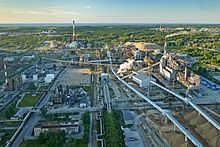
Back صناعة الصخر الزيتي Arabic Põlevkivitööstus Estonian صنعت نفت شیل Persian Industrie du schiste bitumineux French Индустрија уљних шкриљаца Serbian Сланцева промисловість Ukrainian 油页岩工业 Chinese

The oil shale industry is an industry of mining and processing of oil shale—a fine-grained sedimentary rock, containing significant amounts of kerogen (a solid mixture of organic chemical compounds), from which liquid hydrocarbons can be manufactured. The industry has developed in Brazil, China, Estonia and to some extent in Germany and Russia. Several other countries are currently conducting research on their oil shale reserves and production methods to improve efficiency and recovery.[1] Estonia accounted for about 70% of the world's oil shale production in a study published in 2005.[2]
Oil shale has been used for industrial purposes since the early 17th century, when it was mined for its minerals. Since the late 19th century, shale oil has also been used for its oil content and as a low grade fuel for power generation. However, barring countries having significant oil shale deposits, its use for power generation is not particularly widespread. Similarly, oil shale is a source for production of synthetic crude oil and it is seen as a solution towards increasing domestic production of oil in countries that are reliant on imports.
- ^ Dyni, John R. (2010). "Oil Shale". In Clarke, Alan W.; Trinnaman, Judy A. (eds.). Survey of energy resources (PDF) (22 ed.). WEC. pp. 93–123. ISBN 978-0-946121-02-1. Archived from the original (PDF) on 2013-11-09.
- ^
"Non-Nuclear Energy Research in Europe – A comparative study. Country Reports A – I. Volume 2" (PDF). European Commission. Directorate-General for Research. 2005. EUR 21614/2. Archived from the original (PDF) on 2007-10-25. Retrieved 2007-06-29.
{{cite journal}}: Cite journal requires|journal=(help)
© MMXXIII Rich X Search. We shall prevail. All rights reserved. Rich X Search